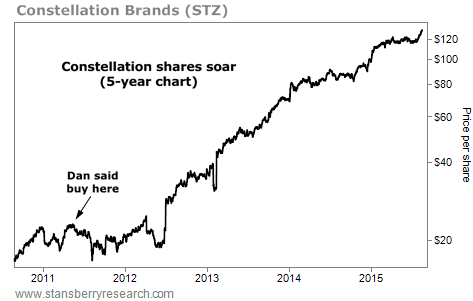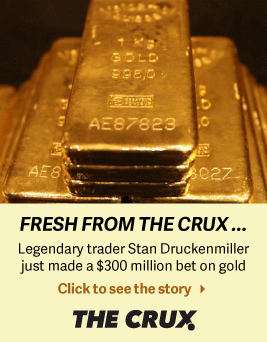| Home | About Us | Resources | Archive | Free Reports | Market Window |
|
Editor's note: Today, we're sharing a classic essay from Stansberry Research Editor in Chief Brian Hunt. With gold prices down around 40% since their 2011 peak, now is a great time to stock up on gold bullion "insurance." Read on to learn how you can use gold to protect yourself against a financial crisis...
The Ultimate Insurance Against Financial DisasterBy
Thursday, August 20, 2015
You wake up in the morning, turn on the news, and get a sick feeling in your stomach...
The stock market is crashing again.
Another big Wall Street bank has failed.
Your 401(k) has lost another 25%. It's bleeding value every week.
Your dream of early retirement is history. You've lost so much money in stocks that even a "regular" retirement is in jeopardy. If you live a long life, there's no way you'll have enough money.
This is the financial-disaster scenario that terrifies a lot of investors.
It's what kept people up at night during the 2008 credit crisis.
These days, everyone likes to read and talk about the dangers of another financial crisis.
Could something like 2008 happen again? Could another crisis cause the value of the U.S. dollar to collapse? Could the banking system seize up overnight?
Many brilliant people say the answer to all of these questions is "yes."
Fortunately, I don't need to know the answer to these questions... and neither do you.
The good news is that it's very easy to buy insurance against financial disasters like these. I personally own this insurance.
Many of the smartest, wealthiest people I know own it, too. It could mean the difference between a comfortable, early retirement... and just barely getting by.
First, let's agree on what "insurance" is...
In my book, buying insurance comes down to spending a little bit of money to hedge yourself against a disaster.
Throughout our lives, we spend a little bit of money on insurance and hope we never have to use it.
For example, home insurance costs a small fraction of your home's value. You buy it and hope you never have to use it.
The same goes for car insurance. It costs a fraction of your car's value, so you buy it and hope you never have to use it.
It's the same with "wealth insurance."
You can buy wealth insurance and hope you never have to use it.
There are hundreds of wealth-insurance policies out there. They involve intricate details, lots of forms to sign, and payments of big fees to advisors and salesmen (which are often the same thing).
But I'd rather keep things simple and keep money in my pocket instead of a salesman's pocket. You might be in the same boat.
Here's how we can do it...
Put a small portion of our wealth in gold bullion.
That's it.
That's all it takes to get wealth insurance... and protect your family against a financial disaster.
You don't need complicated insurance products. You don't need to pay big fees to a salesman. Just pay a small commission to a gold seller, store the gold in a safe place, and you're done.
Here's why this "insurance" is important...
Some very smart people are predicting a global depression, a collapse in the dollar, and a huge increase in the price of gold.
For example, Seth Klarman is a legendary investor. He's probably the smartest financial mind you've never heard of. Klarman is warning that the Federal Reserve's low-interest-rate policy has distorted the financial markets... and is setting us up for disaster.
Klarman and others bring up good points. The U.S. government is spending way too much money on wars, Obamacare, welfare, and other programs. Europe and China's economies could decline and trigger a global recession. These are all real risks to your retirement account.
Even if you're more optimistic and think things will be fine, I think you'll agree that it makes sense to own some insurance in case a financial disaster strikes.
People would likely flock to gold in a global financial disaster... and cause its price to soar. For example, the decade from 1970 to 1980 was marked by war, recession, and very high inflation. This made the 1970s a terrible decade for stocks and bonds. But it was terrific for gold owners. As people fled stocks for precious metals, gold gained more than 2,000% during the decade.
That's why it makes sense to buy gold as a form of insurance.
The good news is that you don't have to buy a huge amount of gold to have a good insurance policy. You can place just 5% of your portfolio into gold.
Its place in your portfolio could mean a huge difference in your family struggling to get by... or doing well.
Let's say you have a $100,000 portfolio with 95% of it in blue-chip stocks and income-paying bonds.
You place the remaining 5% of your portfolio into gold. This gives you $95,000 in stocks and bonds, and $5,000 in gold.
If the predicted financial disaster doesn't strike, your stocks and bonds will increase in value.
Your gold will probably hold steady in price or decline a little. Since the bulk of your portfolio is in stocks and bonds, you'll do just fine.
But what if the financial disaster strikes? I've heard some top analysts say gold could climb to $7,000 an ounce in a financial-disaster scenario.
Let's say a financial disaster sends the value of your stocks and bonds down 50%. That would be a massive decline. Throughout history, only the worst, most severe bear markets sent stocks down this much.
This epic financial disaster would cut your $95,000 position in stocks and bonds by 50%, leaving you with $47,500. But let's say this disaster also causes gold to rise to $7,000 an ounce. So, for example, if gold were $1,090 per ounce… a rise to $7,000 would produce a more-than-sixfold increase in the value of your gold. It would cause the value of your $5,000 gold stake to rise to about $32,110.
Post-financial disaster, you'd be left with $79,610 ($47,500 from stocks and bonds + $32,110 from gold).
The disaster still would hit you, but not nearly as hard. Your insurance would play a big role in limiting the damage.
But what if you think the chances of financial disaster are higher than "unlikely"?
What if you're more worried than the average Joe?
If you are, simply increase the "insurance" portion of your portfolio. Instead of a 5% position in gold, you could increase it to 20%.
If the previously mentioned financial disaster were to strike your $100,000 portfolio weighted 80% in stocks/bonds and 20% in gold, the math would work out like this:
The 50% decline in your $80,000 stocks/bonds position would leave you with $40,000. Gold's increase to $7,000 an ounce would increase your $20,000 gold position to $128,440.
Your large gold-insurance position actually would produce a net gain in this scenario. You'd be left with $168,440... an increase of nearly 70%.
As you can see, the larger your gold-insurance policy, the better you would do in a financial-disaster scenario.
But if the financial disaster doesn't strike, you won't benefit as much because you would hold less money in stocks and bonds, which do well if the economy carries on.
And keep in mind... it would take a serious financial disaster to send stocks down by 50% and gold up to $7,000.
Depending on what you think the chances of a financial disaster are, you can adjust your gold-insurance policy. It all depends on your goals and beliefs.
Think the chances of disaster are slim? Consider a gold-insurance policy equivalent to 1%-5% of your portfolio. Think the chances of disaster are high? Consider a gold-insurance policy equivalent to 20% of your portfolio.
Is the next financial disaster around the corner? I don't know the answer.
Nobody does.
But if you buy some "wealth insurance" in the form of gold, you don't need to know the answer. It's simple. It's easy. It's low-cost.
You buy gold and hope you never have to use it. You'll do fine if things carry on. You'll do fine if the crap hits the fan.
And the peace of mind you get from owning gold "insurance" is worth even more than the money it could save you.
Regards,
Brian Hunt
Further Reading:
Dr. David "Doc" Eifrig has shown readers how powerful it can be to hold "chaos hedges" – like gold – in your portfolio... "When investors get nervous about bad economic news... debt crises in Europe... and the specter of runaway inflation in the United States," he writes, "stocks fall, and gold and silver rise." Learn how Doc protects his wealth with precious metals here and here.
In this must-read essay, Dan Ferris explains how owning physical gold and silver preserves the purchasing power of your wealth. The Fed is "an imbecile with a hammer. The hammer is money-printing, and every economic problem is a nail. So you should always own gold..."
Market NotesTHIS BOOZE GIANT IS GENERATING HUGE RETURNS It's a recurring theme in DailyWealth because it works... You can make big money in the "basics"...
As regular readers know, we don't think you need to invest in complicated, "exciting" stocks to make money. Companies that sell things like packaged foods, consumer goods, power tools, auto parts, cleaning supplies, and cigarettes often make for some of the best investments in the market. Selling booze is another prime example...
Constellation Brands is a World Dominator when it comes to alcohol. It's the third-largest beer supplier in the U.S., with brands like Corona and Modelo. It's also responsible for top-selling wine brands like Robert Mondavi and spirits brands like Svedka vodka.
Constellation is a fantastic business and a longtime favorite of Extreme Value editor Dan Ferris. As you can see below, Dan's call to buy the stock in 2011 was spot-on. Since then, shares have skyrocketed more than 500%... and they just recently struck a new all-time high. There's a reason it's the top-performing open position across all Stansberry Research portfolios... Selling the "basics" works.
 |
Recent Articles
|



